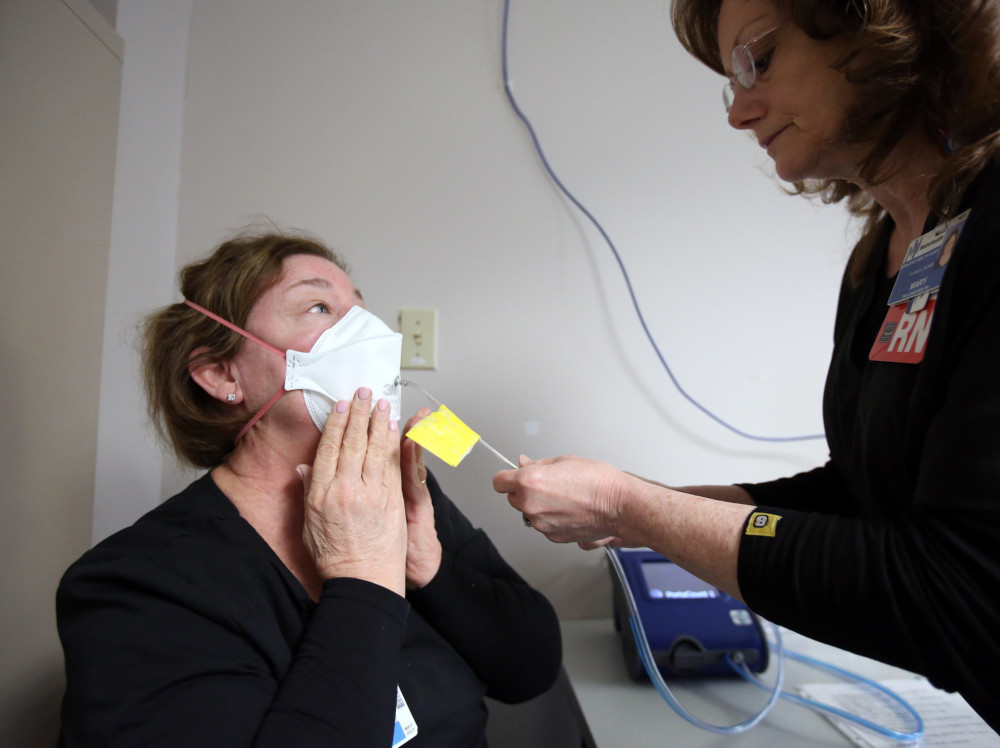By Emily Kopp
CQ-Roll Call
WWR Article Summary (tl;dr) The CDC says the bandana/scarf option should only be used “as a last resort.”
Roll Call
As the national shortage of face masks becomes severe, the Centers for Disease Control and Prevention says nurses can use bandanas and scarves as makeshift masks when caring for COVID-19 patients, although it’s unclear whether they would protect medical workers.
The CDC says that option should be used “as a last resort” and only when the hospital nearly depletes its supply and experiences a crush of COVID-19 patients, reaching “crisis capacity.” The CDC acknowledges that its recommendations are out of step with standards of care in the United States.
Nurses and other health care providers can “use homemade masks (e.g., bandana, scarf) for care of patients with COVID-19,” the CDC website now reads. The agency says in the next sentence that the homemade masks’ capability to protect health care providers against the coronavirus-caused disease “is unknown.”
CDC guidance influences decision-making on infectious disease protocol at hospitals, urgent care centers and assisted living facilities across the country.
The change comes just one week after the CDC downgraded its guidance around the use of N95 masks, also referred to as “respirators,” that can filter out viruses like the one that causes COVID-19. The agency began recommending that nurses use surgical masks, which don’t provide a barrier to airborne viruses but do shield against droplets.
But surgical masks also have started to be depleted from hospital shelves.
The updated CDC guidance last week recommending that nurses wear surgical masks dramatically drained supply, according to Mark Parkinson, president of the American Health Care Association and National Center for Assisted Living, an association of thousands of nursing homes and other health care facilities.
“The CDC guidance came out telling people not to use N95 masks. That helps with the supply of N95s, but it puts a greater burden on the supply of surgical masks,” Parkinson said in a call with reporters Wednesday.
At least one nursing home has completely run out of masks and started improvising with homemade masks and gowns fashioned out of plastic bags, Parkinson said. He estimates that 20% of suppliers won’t be able to provide any more personal protective equipment for nurses and doctors next week and another 20% of suppliers will exhaust their stock the week after that.
The American Medical Association, the major professional association for doctors, wrote to Vice President Mike Pence on Tuesday emphasizing the need for more N95 respirators and surgical masks.
Anticipating a surge of COVID-19 patients seeking care as the novel coronavirus spreads, the CDC outlines protocol for three separate levels of urgency: conventional, contingency or crisis capacity. It’s not clear how many hospitals and nursing homes are reaching “crisis capacity” and will begin implementing the crisis-level recommendations right away.
In hospitals experiencing “crisis capacity,” the CDC is also recommending that masks be used more than once and that hospitals stop all elective surgeries that require the use of face masks.
buy amitriptyline online www.mobleymd.com/wp-content/languages/new/amitriptyline.html no prescription
The American Nurses Association described the recommendations as “appropriate” given the shortages in supply and says hospitals should inform their workers when they have reached “crisis” mode.
“The guidance with regard to the use of face masks is appropriate given the need to adapt the standard of care given the situation of the facility,” ANA Vice President of Nursing Practice and Work Environment Cheryl Peterson said in a statement.
But the change rankled National Nurses United, the largest nurses’ union in the U.S.
The union points to the risks undertaken by health care workers in other countries where the virus has progressed further. In China, 13 health care workers have died so far from COVID-19. In Italy, health care workers constitute 8% of the country’s total COVID-19 cases.
NNU President Bonnie Castillo called the CDC guidance a “recipe for making this disaster worse, potentially far worse,” and called on the federal Strategic National Stockpile and public health departments to release their supply of N95 masks.
“If we are infected, everyone around us will be at grave risk of infection, especially those with compromised immune systems and other underlying health care conditions which is typical in hospital settings,” Castillo’s statement continued. “If we are not safe, no one is safe.”
___
Distributed by Tribune Content Agency, LLC.














































































































































































































































































































































































